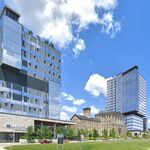aquariaguy
New Member
Just have a quick question. I've been looking at 1+1 condos in the Baview/Sheppard area recently, and the units at St. Gabriel Terrace (650 Sheppard Ave.) caught my eye. However, as I looked into it more closely, I noticed that two condos that were sold in February 2010 had a maintenance fee of $411. One even had $370 (approx) from Nov. 2009. Now, the ones put on the market in November 2010 have had a maintenance fee of $532! These are all 1+1. I contacted an agent to see if he could contact the building management for me regarding these crazy jumps in prices.
I'm new to this real estate stuff, so I was wondering if anyone could give me a clue or any suggestions as to why the huge jump in maintenance fees. The maint. fees don't even include hydro or heat! All that's included is water and 24hr concierge. What's up with that jump in fees than??
Thanks.
I'm new to this real estate stuff, so I was wondering if anyone could give me a clue or any suggestions as to why the huge jump in maintenance fees. The maint. fees don't even include hydro or heat! All that's included is water and 24hr concierge. What's up with that jump in fees than??
Thanks.




